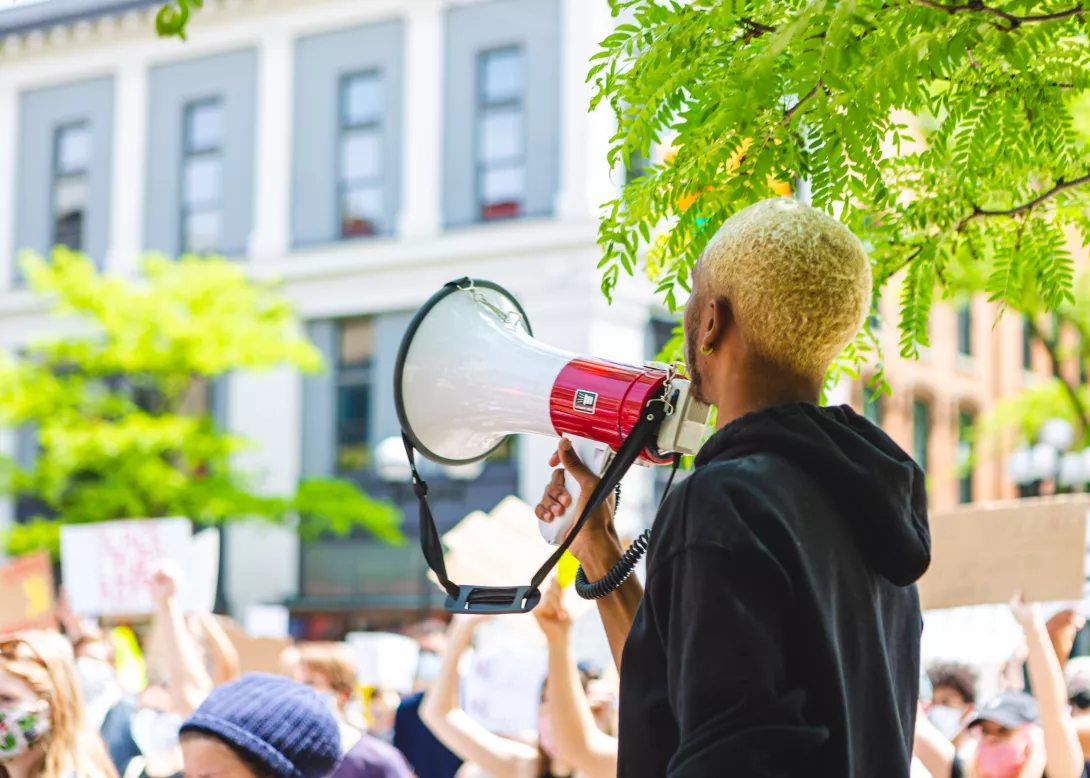Tell me more: Right to Protest
Last Reviewed:
Reviewed By:

Know your rights, limits and risks when protesting to effectively contribute to meaningful social change in Canada
Protesting is a powerful way to make your voice heard and advocate for change. By understanding your rights and responsibilities, planning ahead, and prioritizing safety, you can ensure that your protest is effective and lawful. Stay informed, stay safe, and stay committed to your cause.
Here are some key points:
1. Know Your Rights
- Freedom of Expression and Assembly: The Charter protects your right to express your opinions and assemble peacefully.
- Limitations: These rights are not absolute and can be limited by laws that are justified in a free and democratic society.
2. Plan Ahead
- Research Laws and Regulations: Understand local laws regarding protests. Some areas may require permits for large gatherings. Find bylaws and information on the municipality’s website.
- Location: Choose a location that maximizes visibility and impact without breaking trespassing laws or obstructing traffic unduly.
3. Permits and Permissions
- Permits: Check if you need a permit for your protest. Many cities require permits for marches or rallies to ensure public safety and coordination.
- Communication with Authorities: Notify local authorities about your protest plans to avoid misunderstandings and potential legal issues.
4. Safety First
- Group Safety: Always protest in groups. There’s safety in numbers.
- Emergency Contacts: Have a list of emergency contacts and know where the nearest medical facilities are.
5. Legal Considerations
- Know the Law: Be aware of what constitutes illegal behavior (e.g., vandalism, violence, trespassing).
- Understand Injunctions: Injunctions are orders from the court that can be used to order protestors to leave a certain area and may give police permission to use force to remove protestors. If you violate an injunction you could be charged with a crime.
- Lawyer's Contact: Have the contact information of a lawyer or legal aid service who can assist if you are arrested.
6. Respect Others
- Peaceful Protesting: Violence or vandalism can undermine your cause and lead to legal consequences.
- Engage Respectfully: Engage with counter-protesters or the public respectfully. Avoid confrontations.
7. Stay Informed
- Weather Conditions: Be prepared for the weather with appropriate clothing and supplies (water, sunscreen, umbrellas).
- Current Events: Stay updated on current events that might impact your protest.
8. Documentation
- Record Events: Document the protest with photos or videos. This can be important for legal reasons and spreading your message.
- Social Media: Use social media responsibly to organize, inform, and document your protest.
9. Personal Identification
- Carry ID: Always carry some form of identification, but avoid carrying too much personal information that can be lost or stolen.
- Emergency Cash: Have a small amount of emergency cash in case you need it.
10. After the Protest
- Debrief: Hold a debriefing session to discuss what went well and what could be improved for future protests.
- Follow-Up Actions: Plan follow-up actions to maintain momentum and continue advocating for your cause.
Essential Items to Bring
- Water and Snacks: Stay hydrated and keep your energy up.
- First Aid Kit: Be prepared for minor injuries.
- Signs and Banners: Clearly convey your message.
- Charged Phone: For communication and documentation.
- Backup Battery: To ensure your phone stays charged.
- Comfortable Clothing and Footwear: Dress appropriately for the weather and for standing/walking for long periods.


Dig Deeper
Right to Gather & Protest, Canadian Civil Liberties Association
Protests and Civil Disobedience, BC Civil Liberties Association
Injunctions and Contempt of Court, BC CIvil Liberties Association
The Arrest Handbook, BC Civil Liberties Association
Can an arrest related to protesting affect my future?
Possibly. A conviction could affect…
- Job and volunteering
- Ability to travel to other countries
- Immigration status*
*For people in Canada who are not citizens (such as permanent residents) you should get legal advice regarding how a conviction could affect your immigration status. Depending on the crime you are convicted of, you may be deported.

 Crime & Police
Crime & Police Money Stuff
Money Stuff Health & Sexuality
Health & Sexuality Legal Life Skills
Legal Life Skills Driving
Driving Family
Family Work & School
Work & School Housing
Housing Basic Rights
Basic Rights